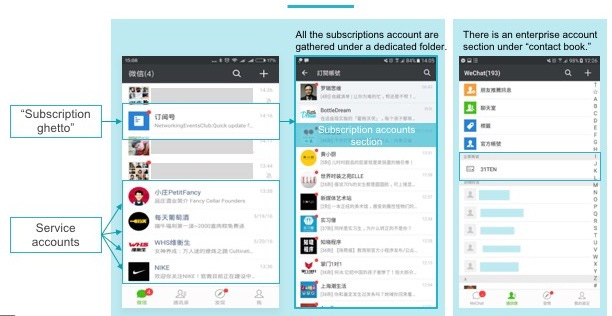A couple of months back, Zuck made an important announcement regarding Whatsapp —
“The best business experiences meet people where they are. Already more than 1 billion users connect with a business account across our messaging services every week. They’re reaching out for help, to find products and services, and to buy anything from big-ticket items to everyday goods. And today, I am excited to announce that we’re opening WhatsApp to any business of any size around the world with WhatsApp Cloud API.”
Since then, if you would have noticed, more apps have been reaching out to get into your whatsapp inbox.
As someone who hates engaging with businesses over whatsapp, I quickly block them. However, I can clearly see the future of whatsapp similar to this -
or this
This is, however, not surprising. The root of this problem lies in monetisation. Every communication app has to monetise eventually and there are only so many options available -
Direct Ads —> This is a very tricky territory because as a platform, you shouldn’t be using messages to gather more data on your users (clear violation of privacy). Hence, a pure-play communication app wouldn’t have a lot of data to make ads more targeted. An exception to this is Messenger, who inserts ads in between but that’d be based on other Facebook data and not your messages.
Business communication —> This is what Gmail and WeChat did. And what whatsapp is doing now. The problem, as I mentioned earlier, is that users still get a cluttered interface. Some users may be okay with it (that’s what it seems with China) but some may not be (like myself). This is more eventual than any of the other options mentioned.
Suite —> Now that you have locked in a user to your app, upsell other items that the user requires along with just communication (e.g. Calendar, File sharing etc). Multiple companies have done this in the past - Microsoft, Yahoo, Google etc.
Direct user payments —> Charge X$ per month for users to use whatsapp. Considering communication apps like whatsapp are designed to be global, not everyone will have the paying capacity. Additionally, with the ubiquity and ingrained behavior of such apps, users almost treat communication apps as a right.
Freemium —> Make the base product free but have premium tiers for different use-cases. This can tie in with the suite offering mentioned earlier (personal users have Gmail free, but business users pay for the Gsuite) or can be implemented differently (e.g. additional payment for high resolution pictures, more storage)
Some of these may work better than others, but at the end of the day, this is a finely balanced decision. And if Whatsapp gets it wrong, the next generation wont prefer that as the default communication app.
Generational trends
Gmail was the default communication interface for the generation before me.
Whatsapp is the default for mine.
Snapchat / Instagram are the default for the next one.
Roblox / Minecraft are probably the default for the one after (currently).
Why does this happen?
I wrote in detail on this in this post, but the gist is
Hardware innovations
Need for self-expression & status manifested differently
As users (particularly younger ones) start spending more time on a platform, that platform also becomes the default in terms of communication. Note that this is slightly different from what has happened before.
As in, Gmail, Whatsapp and WeChat didn’t start out with content as a use-case, but directly communication as a use-case. However, that was possible because they rode two trends at once: mobile adoption and internet adoption.
But once everyone has smartphones and internet, there’s little room to replicate the same communication-first adoption (except if a new platform like Oculus become big).
Hence, the need for self-expression takes priority, which manifested itself differently through Snapchat (camera first) and Roblox (hanging out first).
There’s also another variable here -
Digital Identity
In an era where mobile internet was not very popular, emails were the main source of digital identity. And hence, Gmail / Outlook were the main product.
In the era with mobile internet penetrated, mobile numbers became a primary source of identity, and Whatsapp leveraged that to grow. This also has a virtuous loop built into it : more people have phone number and mobile internet —> more people use whatsapp —> more people get phone number and mobile internet to talk with those other people etc.
A change in digital identity also opens up a way for new communication channels to be established. So how do new digital identities come about?
Protocol driven —> Email was the result of this as SMTP became ubiquitous. With blockchain, digital wallets are the new identities.
Platform driven —> As Instagram, Twitter became more penetrated, more people started sharing those handles instead of their phone numbers. Akin to these software platforms, if VR becomes more pervasive, there will be a digital identity there (although it may not be new because if Oculus paves the way, your existing FB identities there will suffice)
Ultimately, because network effects1 involved in a communication app are massive, a new communication app may require not just one but multiple of such forces to work together for it to grow big.
E.g. Email adoption was a result of SMTP + personal computers’ adoption. Younger people get more privacy conscious, don’t want to share their numbers, dont like getting messages from business and hence may move away from whatsapp.
However, this is still very hard to predict. The only thing I can predict with reasonable confidence, like with all things technology, is that new paradigms do come about; you just don’t know when.



